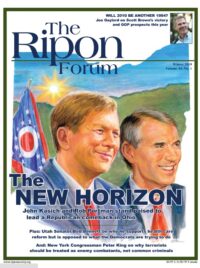It is a relatively new tradition for the party that is out of power to give a response to the President’s State of the Union.
This was done initially by Congressional Democrats who in the mid-80’s desperately wanted to give their side of the story in response to President Ronald Reagan’s State of the Union Addresses.
They wanted to provide balance.
In the spirit of balance, I will provide this response to your address.
You have given another well-delivered and glib speech to the country. You have attempted to convince people that everything you have done is fine and honorable, and everything your opponents have done is corrupt and misguided.
You have continued the fiction that all is well in America, and that the state of our union is strong.
You have also done all of those things that so many presidents have done in the past. You have laid out your agenda for the New Year, you have urged the Congress (which you control, by the way) to get moving on last year’s agenda, you have detailed your new spending wish list, and you have kept your colleagues moving up and down in their chairs for a better part of an hour, all in the hopes of currying favor with the voters.
One thing you haven’t done is put it all in context for the American people. You haven’t talked to them about the very real challenges this country faces in honest terms.
Mr. President … You have continued the fiction that all is well in America, and that the state of our union is strong.
So, what I would like to do is be straight with the citizens of this great country.
In the spirit of balance, I would like to talk about the seven ways this country is, well, out of balance, why that lack of balance will hurt the long-term health of this country, and what we should do to bring ourselves back into balance.
Fiscal Imbalance
We can’t continue to spend money we don’t have on government spending we don’t need. We can’t continue to borrow money from the Chinese government to fight terrorists in Afghanistan. We can’t continue to borrow money today with the promises that we will pay it back a generation from now. At some point, the bills will come due. At some point in the not-too-distant future, the interest payments we pay on our debt will exceed the money we spend on our national defense. At some point, we will either have to sharply raise taxes, sharply cut spending, or see inflation spiral out of control.
Our budget is not just a little out of balance. It is out of balance in historically high terms. We are deeper in debt than we have ever been in our nation’s history.
Our budget is not just a little out of balance. It is out of balance in historically high terms. We are deeper in debt than we have ever been in our nation’s history. Our debt as a percentage of GDP is at a higher percentage than at any time since the Second World War. This is unsustainable and unnecessary. Just a decade ago, we had a budget surplus. We need to get back to a budget surplus so we can start paying off some of this debt.
Trade imbalance
Trade is an essential part of any growing and thriving economy. But trade, by its very nature, is a two-way transaction. You trade something of value to me and I trade something of value back to you. Over the last 15 years, we have traded our dollars for consumer products of all kinds, and, unfortunately, to a much lesser extent, we have traded our products to people in other countries for their version of dollars.
A healthy trading relationship means that the trade in products and money is roughly in balance. We have a healthy trading relationship with Europe, to a large extent. We don’t have a healthy trading relationship with China. They make all the products and we consume them all. This needs to change for a long-term, balanced relationship between our economies. The Chinese need to consume more of our products and we need to consume less of theirs.
Age Resource Imbalance
A nation that spends considerably more on its senior citizens than it does on its young people is a nation that is looking not to the future for its inspiration, but to its past.
We don’t spend enough making our kids ready to compete for the future. We don’t spend enough on education, we don’t invest enough in teacher quality, and we don’t do everything we can to make America’s future brighter. We can’t, because we spend so much of our resources on senior citizens, now and in the future. Our national budget tells the story.
We don’t spend enough on education, we don’t invest enough in teacher quality, and we don’t do everything we can to make America’s future brighter. We can’t, because we spend so much of our resources on senior citizens, now and in the future.
Social Security and Medicare cost the federal treasury well north of a trillion dollars a year (last year, it was $1.152 trillion). Last year, we spent about $70 billion on education (at the federal level) and children’s health care. We need to find a way to achieve a better balance on that spending allocation.
Private and Public Sector Imbalance
Without a robust, vibrant, and large private sector, the public sector won’t have the resources to operate. After all, somebody has to pay the taxes to fund the government. But over the last couple of decades, the public sector has threatened to eclipse the private sector in its size and its cost. This imbalance has dire budgetary implications, at the local, state and federal level.
For example, while the private sector has largely abandoned defined benefit pension plans, understanding that individual companies can’t afford them, the public sector continues to insist on them. But that leads to large budget problems at all levels of government. Another example comes with labor contracts. Government jobs are as close to permanent as just about anything can be in this life, no matter what the performance of the government employee. In the private sector, employees have to perform or they risk losing their jobs. This imbalance builds resentment between those who work in the government and those who don’t.
Government jobs are as close to permanent as just about anything can be in this life, no matter what the performance of the government employee. In the private sector, employees have to perform or they risk losing their jobs.
We need to seek greater parity between the two. We certainly shouldn’t give the public sector employees a better deal than they can get in the private sector.
Wealth Imbalance
Democrats look at the gnawing wealth imbalance in this country and see that the rich are making too much. I see the great wealth imbalance and think that the poor and the working class aren’t making enough. I believe that the marketplace should and does accurately assess the worth that each employee brings to the market. We shouldn’t try to manipulate the market to bring the rich and poor closer together. We should try to improve the worth of the worker so we can make the poor richer.
We shouldn’t try to manipulate the market to bring the rich and poor closer together. We should try to improve the worth of the worker so we can make the poor richer.
Life-long education and worker-retraining is a necessary component in making the poor more productive. Making communities safer, keeping drugs out of the hands of kids, and improving the chances for families on the margins is another part. The President has authorized a surge in Afghanistan. Perhaps it is time for a surge in our most isolated and distressed communities to help them climb out of poverty.
National Security Imbalance
It is time for us to reconsider the basic premise that has dominated the national security discussions for the last 50 years. It is the “I’ll buy, if you fly” philosophy. We take care of the national security interests of all the Western world (including Japan), and they allow us to use pieces of their countries to store our weapons, planes and armed services personnel.
In the second half of the 20th century, this all made perfect sense. The rest of the world needed our robust presence to keep the Soviet Union at bay and to impose stability in an instable world. It also made sense because America, with its economic superiority, could afford it. Well, we can’t afford it anymore.
If our allies want the promise of American economic security, they should start helping us pay for it. If they don’t want it, we should pull our troops out.
If our allies want the promise of American economic security, they should start helping us pay for it. If they don’t want it, we should pull our troops out.
Political Imbalance
This all comes to my final point. The American people want Republicans and Democrats and Independents to all work together, free of spite, in a spirit of bipartisanship. That’s not going to happen any time soon. But hard-won bipartisan compromise can and should happen.
Right now, the political system is leaning severely to left, while the country is leaning slightly to the right. Liberal Democrats run the House, the Senate and, of course, the President is the leader of the liberal Democrats. But according to polls, only 20 percent of the country sees themselves as liberal.
What the system needs now, more than ever, is divided government. This will give the President a counterweight, to bring him closer in line with the wishes and hopes of most Americans, who are centrist in their ideological makeup.
What the system needs now, more than ever, is divided government.
Mr. President, the purpose of the response to your State of the Union address is to provide the American people with both sides of the argument, to give the viewers a more balanced assessment of the world. Balance is an important attribute in life, in policy and in politics.
I believe that in many key ways, America is dangerously out of balance. It is time that we seek greater balance as we work together to move this country forward.
John Feehery is a former congressional aide. He is also the founder and president of The Feehery Group (www.thefeeherygroup.com), a boutique advocacy firm that focuses on communications and government affairs strategy.





